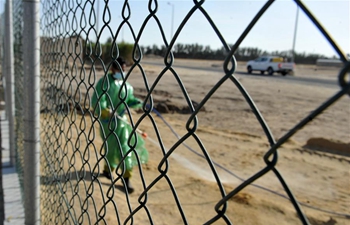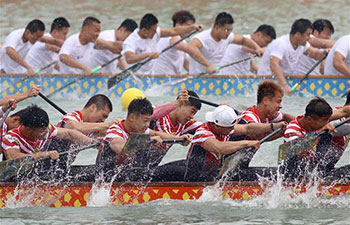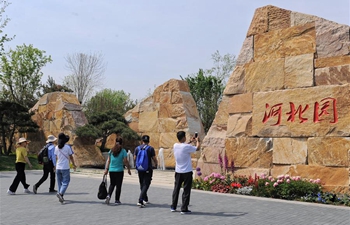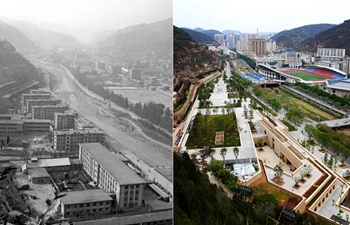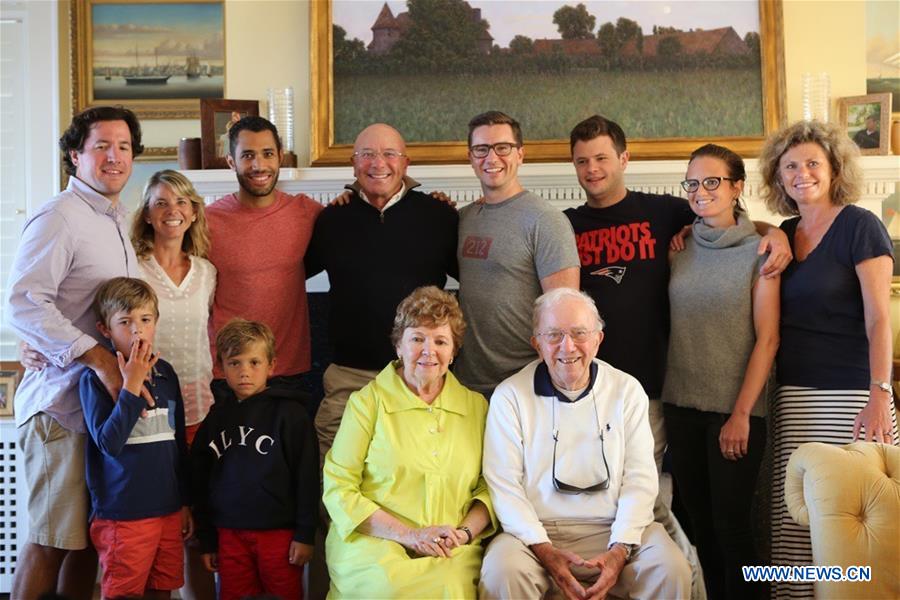 ?
?James E. Bryant (1st R, front), his wife Dorothy Bryant (2nd R, front), son James Bryant (4th L, rear), grandson Ben Bryant (3rd R, rear) and other family members are pictured in Marblehead, Massachusetts, the United States, August 23, 2014. James Bryant will never forget the day when his 93-year-old father went back to his bedroom and came back with a flight brief case containing papers related to the training and assignments he took as a U.S. Flying Tiger pilot during the World War II. As a "remarkable" yet "humble" man and a loving father, James E. Bryant did not show any detailed evidence about his war experience until about three years ago, the son recalled. (Xinhua)
by Xinhua writers Wu Xiaojun, Pan Lijun and Han Fang
NEW YORK, May 14 (Xinhua) -- James Bryant will never forget the day when his 93-year-old father went back to his bedroom and came back with a flight brief case containing papers related to the training and assignments he took as a U.S. Flying Tiger pilot during the World War II.
As a "remarkable" yet "humble" man and a loving father, James E. Bryant did not show any detailed evidence about his war experience until about three years ago, the son recalled.
"So it was for the first time, I had a chance to see all these. Really pretty cool!" the junior Bryant said, adding that it was usually at his insistance that his father told him the stories about how he helped the Chinese fight Japanese invaders.
When his father passed away at 96 in February, his 92-year-old mother was deeply moved by pouring letters of condolences from China, from people either familiar or not known to her, said Bryant.
"Friendship never happens accidentally. They're the consequence of shared dreams and common experiences during the Flying Tiger times. So, that's exactly what evolved between the Flying Tigers and the people of China," he stressed.
The Flying Tigers, a U.S. air squadron composed of pilots from the United States Army Air Corps, Navy, and Marine Corps, helped the Chinese fight Japanese invaders in WWII.
"I think it was just remarkable. At that time, the United States and China had a common dream, and the common dream was to remove the Japanese from China," said Bryant. "The shared experiences that we had there together built lasting friendships."
CHINA WILL NEVER FORGET
After his father passed away, James Bryant learnt more about what his father did during the war either from his father's war-time friends or records he had never seen before.
At a gathering of WWII veterans and their family members in Las Vegas over the weekend, Bryant presented two specially created memorial posters for his father. Many sitting in the audience were greatly moved.
The posters, each with a big picture of young James E. Bryant in his pilot uniform, carry about 200 signatures of Chinese veterans, who had fought with Flying Tigers against Japanese invaders, and their family members, as well as a number of Chinese volunteers.
The idea of creating the posters came from a volunteer who worked for organizations supporting the Flying Tiger veterans after seeing a message of Bryant's Chinese business partner about his father's death in a WeChat group.
The signatures were collected from nine Chinese provincial regions including Hunan, Guangdong, Taiwan and Hong Kong just in about 50 days.
When 63-year-old Bryant traveled to Hong Kong to get the posters, he was greeted by 101-year-old Flying Tiger pilot James Chen (Chen Bingjing) and over a dozen volunteers.
"He had many stories that overlapped with the time when my father was there," Bryant said.
At the two-day conference, he echoed with the familiar sentences written in a letter from China to a Flying Tiger veteran, "We know what you did, China will never forget."
Many Chinese people remember the sacrifices of the Flying Tigers and cherish the friendship between the peoples of the two countries and show their respect, said Bryant.
"If we can be helpful in any way and letting more people in America know how much the people of China recognize the cooperation that existed during the World War II, I'll be very pleased," he added.
REMARKABLE AND HUMBLE FATHER
Describing his father, the most frequently used words by Bryant was "remarkable" as a fighter pilot in WWII and "humble" as an ordinary man and a loving father.
Coming from a big family of 11 children, Bryant's father had four brothers who fought in WWII and three of them had actually fought against the Japanese, said the son.
Leaving his study at a university in Texas, he joined the army in the early 1940s and went to China after receiving pilot training in 1944. Then he became a P-51 fighter pilot with the 74th fighting squadron.
"Though my father had never been back to China because of his old age, often he would wear a hat that has the symbol of the Flying Tigers symbol. He had another hat that had a picture of the P-51 fighter plane called 'Mustang' that he flew on that," Bryant said.
The P-51 Mustang was a single propeller plane. The most advanced fighting aircraft of its day was very good in combating against the Japanese aircraft.
Though his father seldom talked about how he fought in China, he did occasionally mention the hard work and sacrifices Chinese people had made during the war, said Bryant.
After his father broke his silence about war experience, Bryant learnt that the work of his father focused on disrupting and attacking Japanese supply lines.
There were quite a few pilots from China that were trained in the United States at that time, and they came back and were well prepared to engage with the anti-Japanese war.
There was a good level of cooperation and a great system for American and Chinese to fight together during the war, his father used to tell him.
GLOBAL PERSPECTIVE FROM FATHER TO SON
Bryant's first trip to China was in 1992, and he spends quite a lot of time in China each year.
He visited places where his father had battled against Japanese troops and visited Flying Tigers museums, where he learnt more about what his father and other veterans did during the war.
Bryant believed that his father's great impact on him is his vision of globalization, so he linked his business with global cultural exchanges.
"My company's business is helping book publishers to find new markets for their books," Bryant said. "We're helping American publishers for example, to export their books in English to China and we're also helping Chinese publishers to export their books in other languages."
Bryant's company name is Trajectory, which has something to do with flight. "I've also put an altimeter -- one of the most important meters on a plane on my desk, in memorial of my father," he said.
"Flying Tiger is a symbol of China-U.S. friendship and cooperation, and I expect it can last long," Bryant said.

